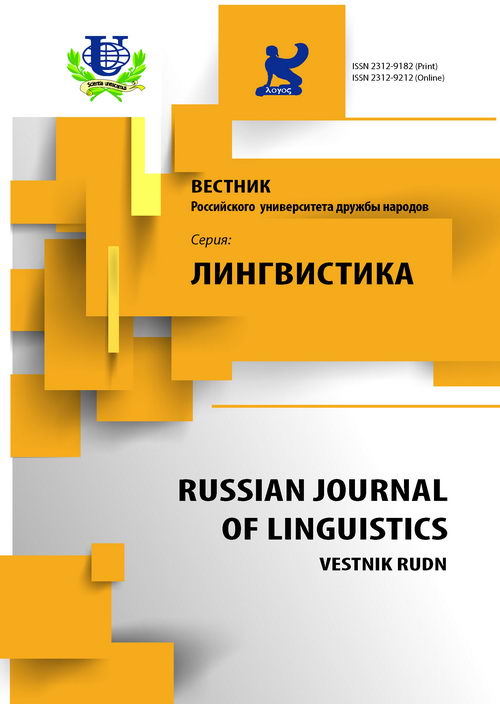World-Building Models of English and Spanish Business Terminology as Reflection of National Morphosyntactic Mentality
- Authors: Litiagina E.A1
-
Affiliations:
- Lomonosov Moscow State University
- Issue: No 3 (2015)
- Pages: 72-83
- Section: Articles
- URL: https://journals.rudn.ru/linguistics/article/view/9427
- ID: 9427
Cite item
Full Text
Abstract
The article is devoted to the comparative analysis of the word-building models of the English and Spanish business terminology. The aim of this article is to hold a contrastive analysis of such word-building models of the English and Spanish business terminology as abbreviation, composition, conversion, contamination, apocope, stress changing, sound alteration, to find out existing differences an similarities in the world-building process in both languages and to investigate the concept “global language” comparing the functioning of both English and Spanish languages as the tools of international business communication, that are maximally standardized examples with most used terminological word forms that should be classified as an international standard usage. In this article the author uses the method of theoretical and empirical analysis, for instance, the investigation of specialized dictionaries, of video conferences and mass media sources in order to collect business terminology, and as well the comparative method of study of business English and business Spanish. The work is based on the analysis of terminological units encountered in the data base of the United Nations, economics and business dictionaries of English Spanish and Russian authors and in of the monographs on the corresponding subject.
About the authors
Elena A Litiagina
Lomonosov Moscow State University
Email: mkharlova@gmail.com
Spanish department Faculty of Foreign Languages and Area Studies
References
- Асчаева М.С. Дериваты словообразовательного гнезда с вершиной «длинный» в метафорической номинации (на материале английского и русского языков) // Вестник Челябинского государственного университета. 2010. № 32(213). Филология. 48. С. 17-20.
- Арнольд И.В. Лексикология современного английского языка. Издание 3, переработанное и дополненное. М.: Высшая школа, 1986.
- Арутюнова Н.Д. Проблемы морфологии и словообразования (на материале испанского языка). М.: Языки славянских культур, 2007.
- Ахманова О.С. Словарь лингвистических терминов. 2-е изд. М.: УРСС: Едиториал УРСС, 2004.
- Богородицкая В.И. Общеупотребительная бизнес-терминология в современном аутентичном англоязычном дискурсе. Диссертация. МГУ им М.В. Ломоносова. Москва, 2010.
- Болдакова В.П. «Неологический бум» - современное состояние английского языка. URL: http://sibac.info/index.php/2009-07-01-10-21-16/1264-l-r-----.
- Буянова Л. Терминологическая деривация в языке науки. Когнитивность, семиотичность, функциональность. М.: Флинта, 2011.
- Елисеева В.В. Лексикология английского языка. СПб., филологический факультет СПБГУ, 2005.
- Медведева Н.Е. Пути повышения качества преподавания иностранного языка // Вестник МГУ. Сер. 19. 2008. № 4. С. 35-42.
- Михальченко В.Ю. Словарь социолингвистических терминов: Российская академия наук. Институт языкознания. Российская академия лингвистических наук. М., 2006.
- Раевская М.М. Язык в ментальном пространстве: к проблеме постижения национальной логики мышления // Вестник МГУ. Сер. 19. Лингвистика и межкультурная коммуникация. М., 2006. № 1. С. 27.
- Розенталь Д.Э. Словарь-справочник лингвистических терминов: Пособие для учителя. М.: Просвещение, 1987.
- Садиков А.В. Испанский сквозь призму лексики: Лексикология испанского языка. М.: Книжный дом «ЛИБРОКОМ», 2014.
- Тер-Минасова С.Г. Язык и межкультурная коммуникация. § 3. М.: Слово, 2008. С. 215.
- Тер-Минасова С.Г. Проблемы перевода: mission impossible? // Вестник МГУ. Сер. 19. Лингвистика и межкультурная коммуникация. М., 2012. № 2. С. 9.
- Яковлева Е.Б. Язык делового общения как лингвистическое и культурное явление // Вестник МГУ. Сер. 19. Лингвистика и межкультурная коммуникация. М., 1998. № 1. С. 82-84.
- Brians P. Common Errors in English Usage: Third Edition. Paperback, 2013.
- Carter R., McCarthy M. Cambridge Grammar of English: A Comprehensive Guide Cambridge. University Press. 2006.
- Gomez Torrego L. Gramatica didactica del espanol. EdicionesSM. Madrid, 2007.
- McCrum R. So, what’s this Globish revolution? The Guardian. UK. December 2006.
- Pagon P., Patricia E., Nerriere J.-P. GLOBISH - the communication of the future. Avaliable at: http://www.jpn-globish.com/articles.php?lng=fr&pg=171.
- Real Academia Española, Diccionario de la lengua española, 23. ª ed. Madrid: Espasa, 2014.
- Real Academia Española y Asociación de Academias de la Lengua Española, Nueva gramática de la lengua española. Morfología y sintaxis. Madrid: Espasa, 2009.
- Capital Financiero. Panamanagment Corporation. Pamnama: Bella Vista. № 694 16-22 de junio del 2014.
- Capital Financiero. Panamanagment Corporation. Pamnama: Bella Vista. № 695 23-29 de junio del 2014.
- Capital Financiero. Panamanagment Corporation. Pamnama: Bella Vista. № 696 30 de junio - 6 de julio del 2014.
- База данных ООН, терминология. Available at: http://unterm.un.org/DGAACS/unterm.nsf/ 375b4cb457d6e2cc85256b260070ed33/$searchForm?SearchView.
Supplementary files















